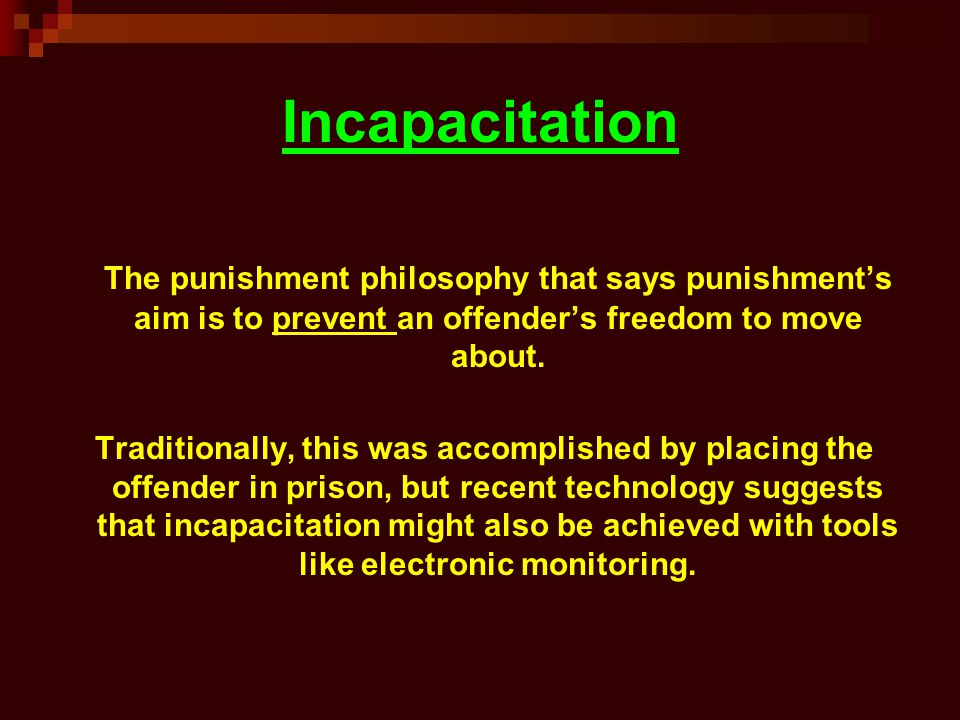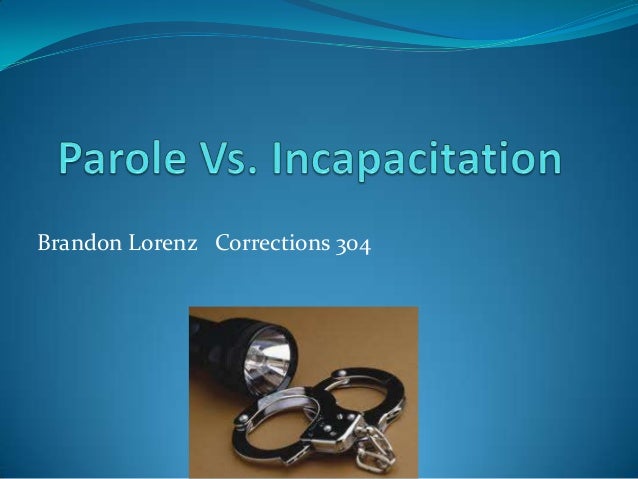Incapacitation is a concept that is often used in the criminal justice system as a way to prevent individuals from committing further crimes. It is the belief that by removing an individual from society, either through imprisonment or some other form of confinement, they will be unable to commit crimes and pose a threat to public safety.
There are several arguments in favor of incapacitation as a criminal justice strategy. One argument is that it can protect the public by removing dangerous individuals from society. For example, if someone has a history of violent crimes and is likely to commit more such crimes if left in the community, incapacitation could be seen as a necessary measure to protect the public.
Another argument in favor of incapacitation is that it can serve as a deterrent to others who may be considering committing crimes. If individuals know that they will be removed from society if they break the law, they may be less likely to do so. This can help to reduce crime rates and make communities safer.
However, there are also criticisms of incapacitation as a criminal justice strategy. One criticism is that it can be expensive to keep individuals in prison or some other form of confinement. This can be a burden on taxpayers and divert resources away from other important social programs.
Another criticism is that incapacitation may not be effective at reducing crime. There is evidence to suggest that imprisonment may not necessarily deter people from committing crimes in the future, and that other factors, such as poverty, lack of education, and substance abuse, may be more important in determining whether someone will commit a crime.
In conclusion, incapacitation is a controversial concept in the criminal justice system. While it can serve as a means of protecting the public and deterring crime, it can also be expensive and may not be effective at reducing crime in the long term. It is important for society to carefully consider the costs and benefits of incapacitation as a criminal justice strategy, and to consider alternative approaches that may be more effective at reducing crime and promoting public safety.
8.4. Incapacitation

Not all offenders are eligible to be released from their prison sentences on parole, however; especially violent offenders are ineligible for parole. Criminals are put in jail not to teach them the consequence of their actions but to bring them under such an environment where they would not be able to engage in crime. What is disaster rehabilitation and recovery? Currently, incapacitation involves incarcerating offenders in jail or prison, sentencing offenders to house arrest, requiring them to wear electronic monitoring devices, placing offenders on probation or parole, and making offenders check in at day reporting centers. Collective incapacitation removes more offenders from society than does selective incapacitation. Since this time, and most greatly exacerbated in the 1980s and 1990s, there has been the increasing use of punishment by prison sentences. What are the four stages of rehabilitation? People were even sent to penal colonies. Incapacitation refers to the restriction of an individual's freedoms and liberties that they would normally have in society.
Incapacitation in Criminal Justice: Definition, Theory & Effect

Although the label is now mostly associated with foreign policy, it was in the heated controversies over these reports that the term neoconservative began to take on real meaning—referring to a small but influential group of Democrats who began to break ranks with their former political allies over the validity and interpretation of these studies. By incapacitating the convicted offender, we prevent the individual from committing future crimes because he is removed from society and locked up or restrained somehow. When prisoners are released early because of cost problems, there are corresponding rises to local crime rates. Wilson, Thinking about Crime New York: Basic Books, 1975 , 170—71. The United States uses incapacitation more than any other country in the world, including countries with much larger populations, such as India and China. This could be considered as collective incapacitation, or the incarceration of large groups of individuals to remove their ability to commit crimes for a set amount of time in the future.
What Is Incapacitation In Criminal Justice » webapi.bu.edu

Offenders are being sent away for longer sentences, which has caused the intake-to-release ratio to change, causing enormous buildups of the prison population. For now, the vanguard theory is that criminal prosecutors, at some point in the late twentieth century, changed their behavior. What is the purpose of rehabilitation for offenders? It removes the ability of an individual to commit a future crime by removing them from society instead of attempting to rehabilitate them or prevent them from making such a decision in the future. Selective incapacitation seeks to address and alleviate prison overcrowding by selectively choosing which offenders to incarcerate. That line refers to the use of incapacitation as a form of punishment. He maintained a belief in the evils of prison, but as the 1970s dragged on—and as the emerging punitive turn became dimly visible—he anxiously tried to find noninstitutional ways to break the crime wave and undercut the hard-liners.
Does incapacitation as a crime control strategy actually reduce crime?

Impact on recidivism and overall crime Longer prison terms seek to reduce crime through incapacitation and deterrence. He was a lowly private, but the trial was remarkably thorough. See also according to legend why did the aztecs move to where mexico city is today What is incapacitation law? Rockefeller Gubernatorial Records, Rockefeller Archive Center. Instead of committing multiple crimes and putting people at risk, the offender is incapacitated in the criminal justice system and not allowed to return. What does incapacitated mean in law? We also examined some other mechanisms of incapacitating offenders from committing crimes, discussed the selective incapacitation an attempt to lock up fewer offenders, namely those who have committed more crimes in general and more violent crimes, for longer periods of time and collective incapacitation locking up more people at a time, such as in the case of mandatory minimum sentences for certain crimes of offenders.
Selective Incapacitation in Criminal Justice

What are the disadvantages of criminal law? Selective incapacitation aims to incarcerate fewer people and reserve prison time for only the most violent repeat offenders. Alfred Blumstein, Jacqueline Cohen, and Daniel Nagin Washington, D. But there is nothing to be said for the more-than-doubling from that already historically high level. The punishment will be overly severe in many cases so that society will be forced to pay thousands of dollars to maintain in prison people who can make contributions to society, and the punishment will be overly lenient in other cases so that dangerous, habitual offenders will be able to commit crimes that a lengthier … What is the incapacitation theory? What is selective incapacitation in criminal justice? The two types of incapacitation are selective and collective. Many of these challenges can be attributed to the experience of being in prison and the resulting stigmatization. Drug rehab is a much more effective solution for those who receive possession charges. Classical criminology fails to explain how individuals choose whether to engage in criminal activity.
What is incapacitation theory of punishment?

Penal colonies were utilized to exile offenders from society and isolate them, typically on an island that was difficult to escape from and far away from the non-offending members of society. By necessity it was a team effort. How does incapacitation work in the criminal justice system? Selective incapacitation is reserved for more serious crimes committed by repeat offenders. Even if American prisons only haphazardly offered therapeutic programs for inmates, the rehabilitative ideal nonetheless influenced the everyday reality of criminal justice, at least until the 1980s. Subsequently, the state relented and gave permission to publish. In British history, this often occurred on Hulks.






